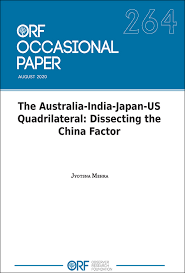The Quad is acquiring strategic content: Australia and India today unveiled their Mutual Logistics Support Arrangement to strengthen cooperation in the Indo-Pacific and help build military interoperability. India has a similar pact with the U.S. and is set to sign one with Japan.
— Brahma Chellaney (@Chellaney) June 4, 2020
The Quad is a symbolic and substantive addition to an existing network of strategic and defense cooperation among four highly capable Indo-Pacific democracies that are increasingly aligned in their shared concerns on regional security. The group’s revival was a form of geopolitical signaling from the four democracies, a way to tell China: “We’re watching, and we’re alarmed,” Heritage analyst Jeff C. Smith observes.
 The Quad’s fate has always rested in India’s hands. Australia, Japan, and the United States are already bound by a deep network of formal treaty alliances, overlapping strategic dialogues, and intelligence sharing arrangements. Drawing India into greater alignment with the other three democracies has been a priority. But New Delhi has long been skeptical, he writes for War on the Rocks:
The Quad’s fate has always rested in India’s hands. Australia, Japan, and the United States are already bound by a deep network of formal treaty alliances, overlapping strategic dialogues, and intelligence sharing arrangements. Drawing India into greater alignment with the other three democracies has been a priority. But New Delhi has long been skeptical, he writes for War on the Rocks:
At this point, it’s less important what the Quad does than what it signals and symbolizes, a weather vane for the four democracies’ threat perceptions vis-à-vis China. The true value of the group lies in its potential, the foundations being laid, and the ability to restructure the scope and agenda in response to changing threat assessments.
If defining the Quad has sometimes proved elusive, it is clear what the Quad is not: an Asian NATO. It lacks the formal alliance structure, administrative machinery, and dedicated purpose of that organization. Like NATO, however, the Quad represents a group of democracies geopolitically aligned amid growing concerns about a common security challenge.
The point of the Quad is not to launch a Soviet-era containment policy, Smith concludes. It is to present a more united front of well-armed, highly capable, largely aligned democracies that can have a deterrent effect on Chinese adventurism and efforts to upset the status quo. RTWT







